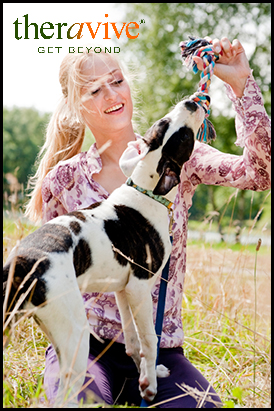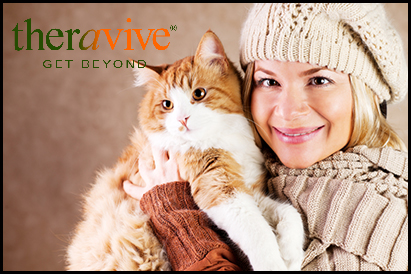 The Cuddle Hormone
The Cuddle Hormone
Anyone who lives with an animal knows firsthand how much they can impact your life, including your health and mental health. The research shows that petting animals stimulate the release of oxytocin, the same feel-good hormone created by nursing babies – commonly referred to as the ‘cuddle hormone’. Studies have proven that petting animals lowers blood pressure, improves mood and increases longevity in patients who have suffered heart attacks .
A variety of professionals use animals to assist in therapy for everything from autism to speech therapy. Cats, dogs, horses, goats, birds, fish and others have been found to have a therapeutic effect on children and adults. People with MS and similar neurological disorders find horseback riding gives them temporary relief from pain and allows them to use muscles they ordinarily cannot use. One program is using dog walking to help people lose weight.
Depression
People who are depressed often find it difficult to get motivated. For some, getting out of bed can seem overwhelming. However, those who have pets often find that caring for the pet provides motivation, and often exercise. Exercise is very helpful in combating depression. Those who take their dogs outside usually benefit from some much needed sunshine, also found to have an antidepressant effect. The oxytocin effect that creates a bond between humans and animals has many beneficial health and mental health effects that include mood enhancement.
Anxiety and Stress
Those who have anxiety or difficulty managing stress may find that petting an animal helps soothe them. Anxiety and stress are rooted in physical symptoms, such as shallow breathing, rapid pulse and increased blood pressure. The oxytocin and soothing impact of petting animals helps regulate these physical symptoms. As noted above, petting animals lower blood pressure and pulse rate which can decrease anxiety.
ADHD
Children and adults with ADHD find that animals are great companions. Pet care such as grooming and feeding is a great way to teach an ADHD child to be responsible. Walking and playing with pets can help channel some of the physical energy for those who are restless or hyperactive. Petting and cuddling help with emotional regulation, a problem for many with ADHD.
Autism Spectrum Disorders
Parents of children with autism-spectrum disorders report that animal-assisted therapy helps them in the home environment where they are more attentive, aware of safety issues, follow instructions more carefully and show improvements in other life skills. Children and adults with autism often experience difficulty with sensory integration. The feel and smell of animals are used to help people with these sensory issues in animal assisted therapy.
Loneliness
The phrase ‘A dog is man’s best friend’ rings very true for those of us who are dog people. Many find the same comfort and companionship with cats and other pets. Nursing homes have become pet-friendly as a result of research that suggests pet ownership and/or interaction relieves loneliness and improves mood. Pets provide a much needed sense of security for millions, and brighten the otherwise long, lonely days for those who may be homebound or simply find themselves spending more time at home after retirement, disability or self employment.
 Companion Animals
Companion Animals
Animals have long been trained to help people with physical disabilities, such as blindness or limited mobility. More recently, the benefits of having an untrained pet as a companion has been cited in the research. Here are some of the findings:
· People with pets are less likely to suffer from depression than those who do have pets.
· In stressful situations, people with pets have lower blood pressure than those who do not have pets.
· Among people over age 65, those who have pets make 30% fewer trips to the doctor.
· Playing with pets increases serotonin and dopamine, two of the brain chemicals responsible for helping us feel calm and relaxed.
· Petting dogs or cats, and watching fish in an aquarium can relieve muscle tension and decrease pulse rate.
· Pet owners have fewer signs of heart disease.
· Of those who had heart attacks, people with pets lived longer.
Pets also improve our lifestyle in ways that have therapeutic benefits.
· Increases our activity level
· Provides human touch and bonding, which has been proven to have a positive effect on even hardened criminals who work with animals
· Improves social interaction with other humans and animals
· Offers structure to our days and lives
· Expands our social network, in many cases
· Gives us a sense of purpose
Special Considerations
Despite all these benefits, it is important to consider carefully if pet ownership is right for you (and the pet). There is a lot of responsibility involved in owning a pet, and some expense. While pets offer many benefits, they do require exercise, routine and emergency medical care, grooming and feeding.
If you are certain you have the energy and resources to care for a pet, the next consideration is what kind of pet is the best match for your lifestyle. Dogs are much higher maintenance than cats. Some dogs are very high energy and need a lot of exercise and space to play and run. Others are more appropriate for living in smaller spaces. All dogs need to be taken outside frequently for exercise and potty breaks. Finding the right breed requires some research. If you plan to get a rescue (highly recommended), talk to the people at the shelter or adoption center about your needs and ask for their advice.
Cats generally need to be kept indoors. There are some exceptions, but many adoption centers only allow people to adopt who agree not to let the cat outside. My cat walks on a leash and can play on an extended leash in our fenced back yard. Otherwise, she stays inside. Strays and rescues that were found outdoors often do not want to stay inside. Consider your needs and theirs carefully. Most cats use a litter box which needs to be cleaned daily. Many find they (or members of their family) are allergic to cats – something to determine before bringing one home to live.
If you find that owning a pet is not for you, but want the benefits of animal involvement, volunteer at a shelter. They always need people to pet the cats and dogs, help with adoption drives and other activities. There are also therapists who provide animal-assisted therapy that would be glad to work with you.
_________________________________________________________________________________________________________________________________
Pets & Mental Health." Pets & Mental Health. Web. 05 Dec. 2013.
Rovner, Julie. "Pet Therapy: How Animals And Humans Heal Each Other." NPR, Web. 04 Dec. 2013.
"The Therapeutic Benefits of Pets." The Benefits of Pets: Caring for a Pet Can Make You Happier, Healthier. Web. 03 Dec. 2013.
About the Author
 LuAnn Pierce, LCSW
LuAnn Pierce, LCSWI am a clinical social worker, therapist and writer. Currently, I offer online therapy and coaching services to people in Colorado and Wyoming. As a provider for the CO Department of Vocational Rehabilitation and the National MS Society, my expertise in counseling people who have disabilities and chronic illness is considerable. I have written for About.com, DailyRx.com, Theravive.com, GoodTherapy.org, SelfHelpMagazine.com and contribute to several other online health and mental health sites.
Office Location:
19th & Dahlia
Denver, Colorado
80220
United States
Phone: 303-910-2425
Contact LuAnn Pierce, LCSW
Professional Website:
http://HireASocialWorker.com